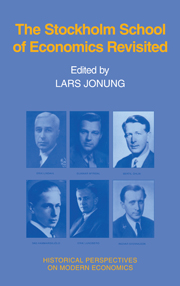Book contents
- Frontmatter
- Dedication
- Contents
- Preface
- List of Contributors
- Dramatis Personae at the end of 1937
- Introduction and Summary
- Part I The roots
- Part II The approach of the Stockholm School
- Part III The impact of the Stockholm School
- 15 The Swedish influence on Value and Capital
- 16 The London School of Economics and the Stockholm School in the 1930s
- 17 Thoughts on the Stockholm School and on Scandinavian economics
- Comment
- 18 Ragnar Frisch and the Stockholm School
- 19 The late development of the Stockholm School and the criticism from John Åkerman
- Part IV What remains of the Stockholm School?
- The Stockholm School: A non-Swedish bibliography
Comment
Published online by Cambridge University Press: 05 July 2013
- Frontmatter
- Dedication
- Contents
- Preface
- List of Contributors
- Dramatis Personae at the end of 1937
- Introduction and Summary
- Part I The roots
- Part II The approach of the Stockholm School
- Part III The impact of the Stockholm School
- 15 The Swedish influence on Value and Capital
- 16 The London School of Economics and the Stockholm School in the 1930s
- 17 Thoughts on the Stockholm School and on Scandinavian economics
- Comment
- 18 Ragnar Frisch and the Stockholm School
- 19 The late development of the Stockholm School and the criticism from John Åkerman
- Part IV What remains of the Stockholm School?
- The Stockholm School: A non-Swedish bibliography
Summary
Paul Samuelson has listed three fiftieth anniversaries that are marked by this conference; let me add that it also marks the delayed tenth anniversary of a similar argument between Paul and myself about the relation between Kahn's 1931 multiplier article and the General Theory, which took place at a 1975 conference at the University of Western Ontario. But before turning to that issue – which is the main one that will concern me in this discussion – let me make a few remarks about some other points in Paul's paper.
First, I am glad that Paul and I are essentially in agreement about the relation of the Stockholm School to the General Theory (see my Anticipations of the General Theory?, Chapter 2).
Second, Paul seems to regard the gestalt approach to the history of thought as being in contrast to my emphasis on the importance of textual evidence. I see no such contrast. On the contrary, I consider my principle of identifying the contribution of an economist with the central message of his writings, and disregarding things he said in passing and to which he clearly did not attach much importance at the time, as being precisely an application of the gestalt approach. Ohlin's 1933 article is a good example of this: for as I point out in my Anticipations of the General Theory?
- Type
- Chapter
- Information
- The Stockholm School of Economics Revisited , pp. 407 - 410Publisher: Cambridge University PressPrint publication year: 1991

